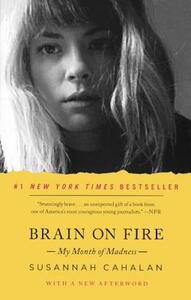Take a photo of a barcode or cover
I have been wanting to read this for so long and it did not disappoint. I think health and medicine are fascinating. This disease is fascinating and heartbreaking. It has been a long time since Susannah Cahalan has been diagnosed. I am interested to do some more research on what has progressed since. Susannah is an amazing journalist and storyteller. It takes a strong soul to tell one's story.
emotional
informative
medium-paced
dark
emotional
informative
mysterious
medium-paced
hopeful
informative
sad
slow-paced
emotional
informative
fast-paced
Intensely interesting, though it loses some of its steam after she’s diagnosed and put on a treatment plan. Still, it’s a bizarre and challenging experience that lends itself to an engaging story.
informative
inspiring
fast-paced
emotional
informative
inspiring
reflective
fast-paced
Susannah Cahalan is a young, up-and-coming reporter with the New York Post when she is suddenly struck with a deep panic: she’s convinced her boyfriend is cheating on her. The left side of her body is going numb. She’s struck by bouts of horrible nausea and seizures, and her mental state violently shifts from euphoric to depressive. Doctors shrugged it off as a young girl who partied too hard and worked too much, and it was months and months before she got an actual diagnosis.
I inhaled this book in a few short days. It's one part memoir, one part mystery, and one part commentary on modern medicine and the US medical system. You feel Susannah and her family's frustration as doctors dismiss her symptoms as alcohol withdrawal or misdiagnose her with everything from bipolar disorder to schizophrenia to epilepsy. It's a huge relief when she finally gets her diagnosis (and she is, eventually, treated and cured), but the road back to full health is as arduous as her path to an accurate diagnosis.
The third and final part of the book might be the least exciting, since the mystery of the illness has been solved, but it also raises some of the most important questions of the book. Can you ever fully recover, physically or emotionally, from such a debilitating illness? Susannah vividly recaps her attempts to return to work, interact with large social groups, and regain her sense of self, often with mixed outcomes. She makes it clear that her diagnosis was truly a miracle, but it did not cure the emotional damages she experiences as a result of her sickness.
The author also spends a good deal of time chronicling the experiences of those who were not so lucky: they remained misdiagnosed, and were either permanently disabled or dead. Susannah realizes how lucky she was to be at one of the best medical centers in the world, with some of the best-trained neurologists in the world, but she is also acutely aware that this is the luck of the draw. In an especially moving chapter, "Survivor's Guilt", Susannah writes about her guilt at being a survivor of her rare illness - she is the 217th person to be diagnosed with this particular ailment - while others who were born too soon, or in the wrong country or into the wrong economic class, suffered in the silence of misdiagnoses or apathetic medical care.
It's an astonishingly brave book.
I inhaled this book in a few short days. It's one part memoir, one part mystery, and one part commentary on modern medicine and the US medical system. You feel Susannah and her family's frustration as doctors dismiss her symptoms as alcohol withdrawal or misdiagnose her with everything from bipolar disorder to schizophrenia to epilepsy. It's a huge relief when she finally gets her diagnosis (and she is, eventually, treated and cured), but the road back to full health is as arduous as her path to an accurate diagnosis.
The third and final part of the book might be the least exciting, since the mystery of the illness has been solved, but it also raises some of the most important questions of the book. Can you ever fully recover, physically or emotionally, from such a debilitating illness? Susannah vividly recaps her attempts to return to work, interact with large social groups, and regain her sense of self, often with mixed outcomes. She makes it clear that her diagnosis was truly a miracle, but it did not cure the emotional damages she experiences as a result of her sickness.
The author also spends a good deal of time chronicling the experiences of those who were not so lucky: they remained misdiagnosed, and were either permanently disabled or dead. Susannah realizes how lucky she was to be at one of the best medical centers in the world, with some of the best-trained neurologists in the world, but she is also acutely aware that this is the luck of the draw. In an especially moving chapter, "Survivor's Guilt", Susannah writes about her guilt at being a survivor of her rare illness - she is the 217th person to be diagnosed with this particular ailment - while others who were born too soon, or in the wrong country or into the wrong economic class, suffered in the silence of misdiagnoses or apathetic medical care.
It's an astonishingly brave book.





